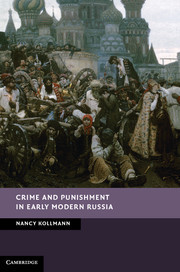Description
Crime and Punishment in Early Modern Russia
New Studies in European History Series
Author: Kollmann Nancy
A magisterial account of criminal law in early modern Russia in a wider European and Eurasian context.
Language: English
Subject for Crime and Punishment in Early Modern Russia:
Approximative price 111.55 €
In Print (Delivery period: 14 days).
Add to cart
Crime and Punishment in Early Modern Russia
Publication date: 10-2012
Support: Print on demand
Publication date: 10-2012
Support: Print on demand
Approximative price 47.09 €
In Print (Delivery period: 14 days).
Add to cart
Crime and Punishment in Early Modern Russia
Publication date: 03-2015
Support: Print on demand
Publication date: 03-2015
Support: Print on demand
Description
/li>Contents
/li>Biography
/li>
This is a magisterial account of the day-to-day practice of Russian criminal justice in the seventeenth and early eighteenth centuries. Nancy Kollmann contrasts Russian written law with its pragmatic application by local judges, arguing that this combination of formal law and legal institutions with informal, flexible practice contributed to the country's social and political stability. She also places Russian developments in the broader context of early modern European state-building strategies of governance and legal practice. She compares Russia's rituals of execution to the 'spectacles of suffering' of contemporary European capital punishment and uncovers the dramatic ways in which even the tsar himself, complying with Moscow's ideologies of legitimacy, bent to the moral economy of the crowd in moments of uprising. Throughout, the book assesses how criminal legal practice used violence strategically, administering horrific punishments in some cases and in others accommodating with local communities and popular concepts of justice.
Introduction; Part I. Judicial Culture: 1. Foundations of the criminal law; 2. The problem of professionalism: judicial staff; 3. Staff and society; 4. Policing of officialdom; 5. Procedure and evidence; 6. Torture; 7. Resolving a case; 8. Petrine reforms and the criminal law; Part II. Punishment: 9. Corporal punishment to 1648; 10. Corporal punishment, 1649–98; 11. To the exile system; 12. Peter I and punishment; 13. Capital punishment: form and ritual; 14. Punishing highest crime in the long sixteenth century; 15. Factions, witchcraft and heresy; 16. Riot and rebellion; 17. Moral economies: spectacle and sacrifice; 18. Peter the Great and spectacles of suffering; Conclusion: Russian legal culture; Appendix: punishment for felonies; Bibliography.
Nancy Shields Kollmann is William H. Bonsall Professor in History at Stanford University. Her previous publications include By Honor Bound: State and Society in Early Modern Russia (1999).
© 2024 LAVOISIER S.A.S.




